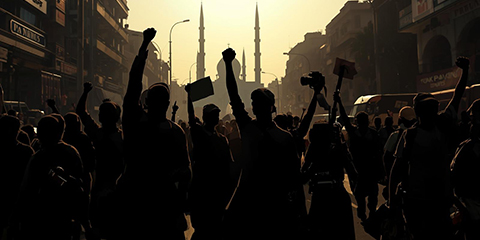A dark day for press freedom in Pakistan: PECA Amendments spark outrage
JournalismPakistan.com | Published 10 months ago | JP Staff Report
Join our WhatsApp channel
ISLAMABAD—On Tuesday, the Senate of Pakistan passed the Pakistan Electronic Crimes Act (PECA) Amendments Bill, triggering widespread condemnation and protests from journalist unions, media watchdogs, and civil society. It marked yet another grim chapter for a media landscape already grappling with stifling censorship.
Prominent journalist Mohammad Malick described the moment poignantly in a tweet: “After Digital Nation bill, Senate passes PECA amendment Act in mere 15 minutes. Free Speech died in Pakistan today.” Highlighting the draconian nature of the legislation, he warned, “Nobody, forget just journalists, will be able to think or speak freely anymore.” Malick’s tweet underscored the fear that these laws—typically the hallmark of authoritarian regimes—are now being championed by the government, a trend he denounced as a betrayal of democratic principles.
Absa Komal, an anchor at DawnNews, called it a “Black day for freedom of speech & expression in Pakistan,” emphasizing that journalist bodies are united in their fight against the amendments in courts. Meanwhile, the Freedom Network described the moment as “a dark chapter in history” and lamented that the amended law would criminalize even legitimate criticism of elected officials.
Sweeping Powers, Severe Penalties
The PECA amendments introduce a Social Media Protection and Regulatory Authority with unprecedented powers to control digital communication. This Authority, strategically staffed with government appointees such as the Interior Secretary and PTA Chairman, is designed to operate as an extension of the state rather than as an independent regulatory body. It effectively weaponizes the law against free expression, granting the government unchecked power to monitor, regulate, and penalize.
The legislation criminalizes vaguely defined “fake news,” imposing penalties of up to three years in prison and fines of Rs 2 million. This ambiguous framing is a dangerous precedent, enabling the state to target legitimate journalism and critical commentary under the pretext of combating misinformation.
Moreover, the law’s provision for a 24-hour complaint resolution window and broad powers to remove content suggests a systemic approach to silencing dissent. These mechanisms appear calculated to suppress digital activism, investigative reporting, and political criticism—hallmarks of a healthy democratic society.
Nationwide Protests and Press Walkouts
Journalists in the Senate’s press gallery staged a walkout as the bill was introduced, echoing scenes from last week when the amendments were passed by the National Assembly. The Pakistan Federal Union of Journalists (PFUJ) has outrightly rejected the amendments, calling them the “blackest law” in the nation’s democratic history. The PFUJ mobilized nationwide protests to demand the bill’s withdrawal.
The legislation’s passage has further united journalist bodies and civil society in their resolve to fight back. As Komal tweeted, the draconian amendments could ignite a long-overdue nationwide movement for press freedom.
Implications for Pakistan’s Global Standing
By enacting such restrictive legislation, Pakistan risks severe international backlash. The PECA amendments could lead to diplomatic consequences, further decline in global press freedom rankings, and reputational damage on the world stage. These laws also threaten to stifle digital innovation and activism, creating a heavily surveilled and controlled environment that stands in stark opposition to the principles of free expression and democratic transparency.
A Calculated Tool of Repression
The PECA Amendment is more than a media regulation bill. It is a calculated instrument of political repression designed to preemptively silence dissent. In an era where digital platforms have become vital tools for accountability and activism, such laws are a deliberate move to curb public discourse and preserve the status quo.
The Senate’s actions have underscored a disturbing trend of eroding freedoms in Pakistan. As journalist Mohammad Malick aptly put it, “Shame on this government, and shame on everyone who helped to pass these laws.” It remains to be seen whether the judiciary or public pressure can overturn this legislative assault on press freedom. For now, however, Pakistan’s media and civil society face an uphill battle to reclaim their right to free speech.

























